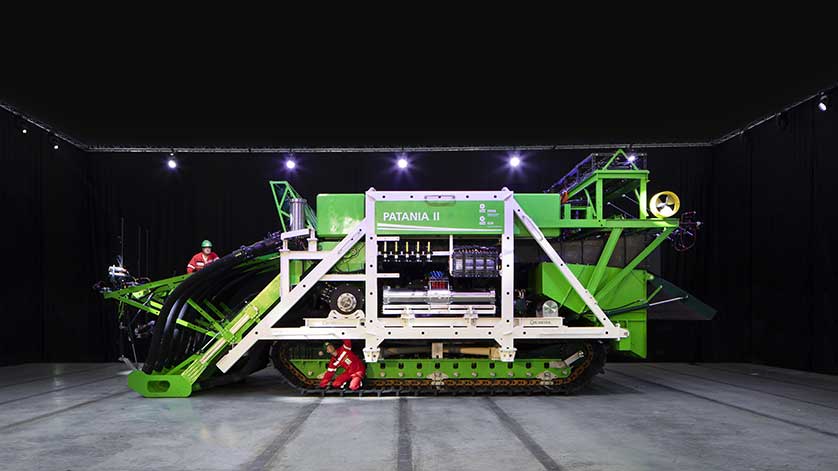A Subsea Vacuum on Caterpillar Tracks: DEME to Test Deepsea Nodule Collector

Global Sea Mineral Resources (GSR), DEME’s subsidiary specialized in deep sea harvesting, has unveiled the nodule collector Patania II. Next, it will test the machine to see what kind of impact it has on seabed organisms.
The Patania II integrates the track design of the first Patania prototype with a suction head to collect polymetallic nodules from the seabed. The pre-protoype is the successor of the tracked soil testing device Patania I, which was tested during a 2017 expedition in the Central Pacific Ocean.
While performing tests on the seabed for three weeks, GSR strived to find a balance between speed, performance and respect for the environment. The robot, controlled from a ship by a 5-km-long cable and joystick, was not supposed to cause excessive turbidity of the waters, for example, as this can negatively impact the environment.
According to Kris Van Nijen, Managing Director of GSR, the tests were a success, “We had to reach 0.5 m/second to be productive. At these depths, no one has ever done this before. In 23 days, the robot had to dive nine times before everything was finally working. One time, we dealt with a water leak the size of a pencil point.”
Based on the Patania I tests, GSR prepared a ‘provisional’ 300-page environmental impact assessment (EIA). In it, the company describe their research on the indirect impact of the mining-related sediment plumes on seabed organisms, which types of fauna live on the nodules, the extent of the turbidity in the aftermath of our work, and so forth.
In 2019 the nodule collector will embark on its first expedition in the GSR and BGR (German) exploration areas, involving a test area of 0.1 km2. Back in 2013, the International Seabed Authority granted GSR a 15-year concession to explore 76,728 km2 of seabed in the eastern part of the Clarion Clipperton Zone in the Central Pacific Ocean.
“In April 2019, our robot will be headed for the water,” said Van Nijen. “In May, we want to make it to San Diego with the message that our mission has been accomplished. It remains very exciting. There is always the risk of something not working. The deep sea has no mercy.”
During the expedition the vehicle will temporarily store nodules harvested from the seabed in a hopper for data collection and redeposit them in the test area. GSR will use the test data to validate the performance of the technology and to assess the environmental impact of the test operations.
Polymetallic nodules can be found on the seabed in most oceans around the world and contain large quantities of critical raw materials such as nickel, copper, cobalt and manganese. These metals are vital for the urbanization and electrification of our planet as they are key ingredients for stainless steel, batteries, wind turbines and photovoltaic systems.
GSR has teamed up with Ghent University and together they will monitor the in-situ environmental impact of the Patania II, again gathering crucial design data, allowing GSR to further redesign its technology to increase efficiency and minimize its impact.
Furthermore, an international consortium of scientists from the EU Joint Programming Initiative for Healthy and Productive Seas and Oceans will provide independent and transparent reporting of additional environmental measurements. All information regarding the environment will be publicly available.
Environmental advocacy groups from around the world will be watching the 2019 tests Patania II closely. Sarah Vanden Eede, ocean expert with the World Wild life Fund (WWF) says “These tests are the only way to determine if deep-sea mining is a good idea, from an ecological perspective, or the worst idea ever.”
Patania II was developed by GSR in cooperation with the Belgian engineering company De Meyer, located in Temse, Belgium. For more information, check out GSR’s Deep-Sea Mineral Exploration movie and click here.

